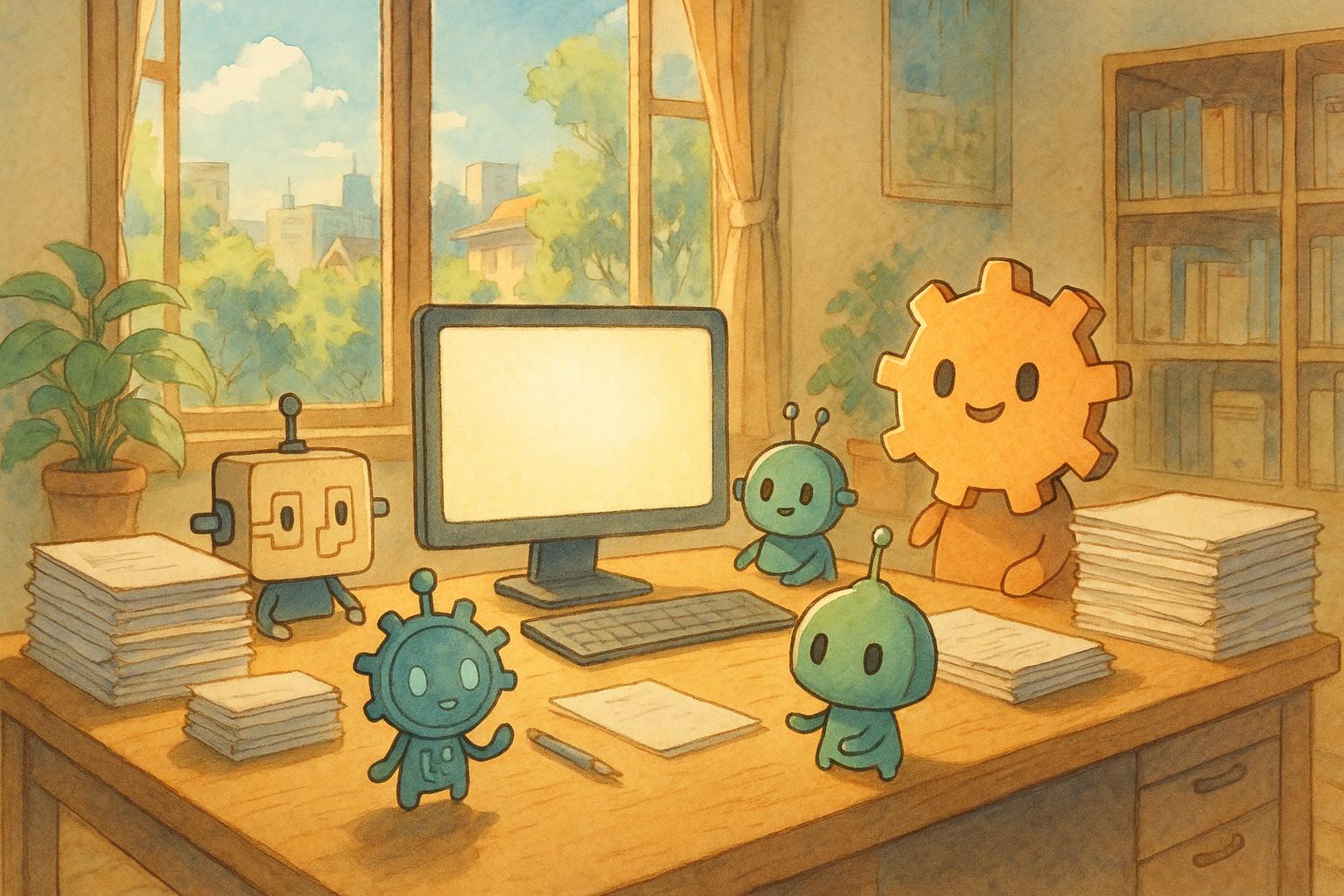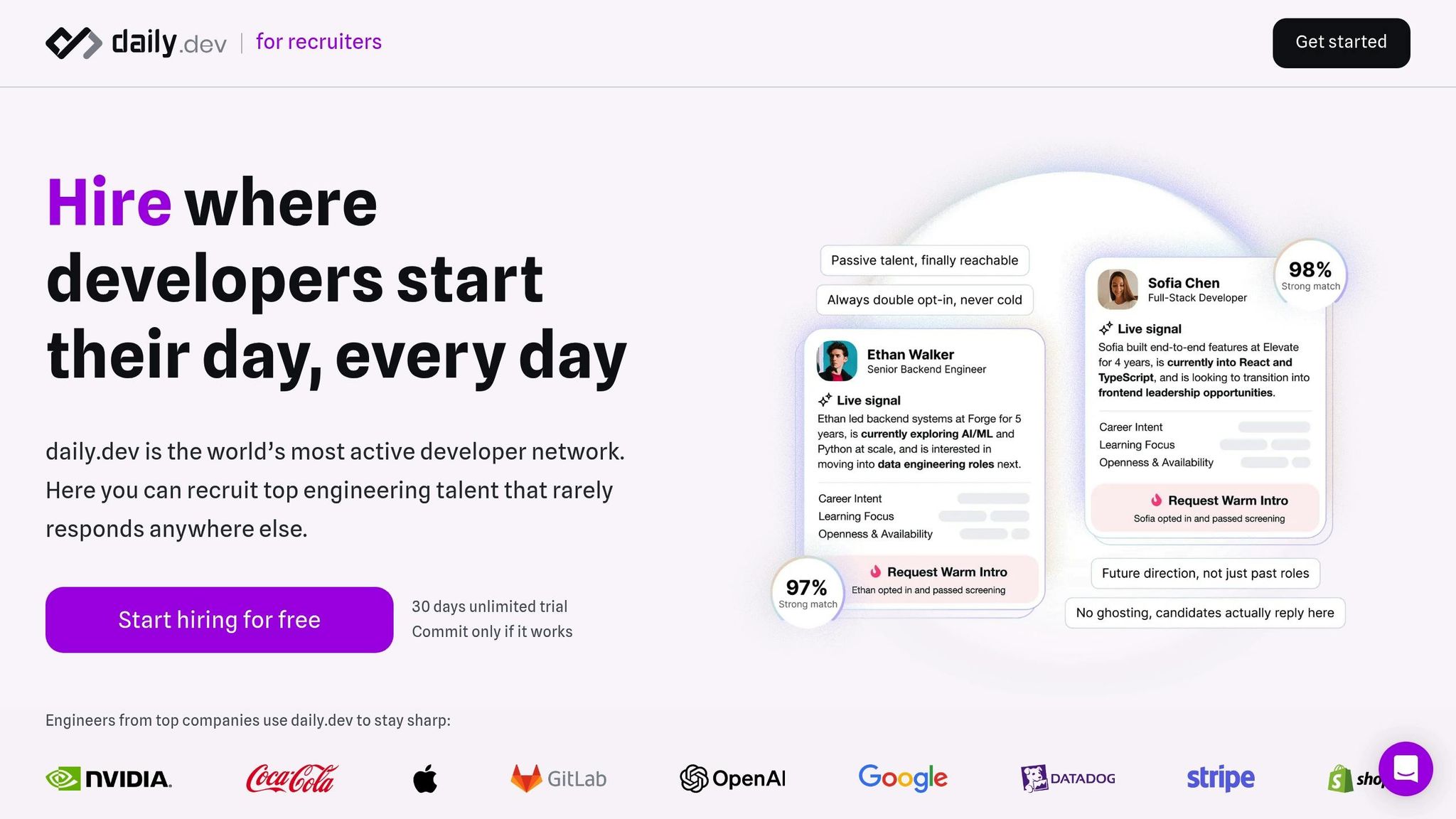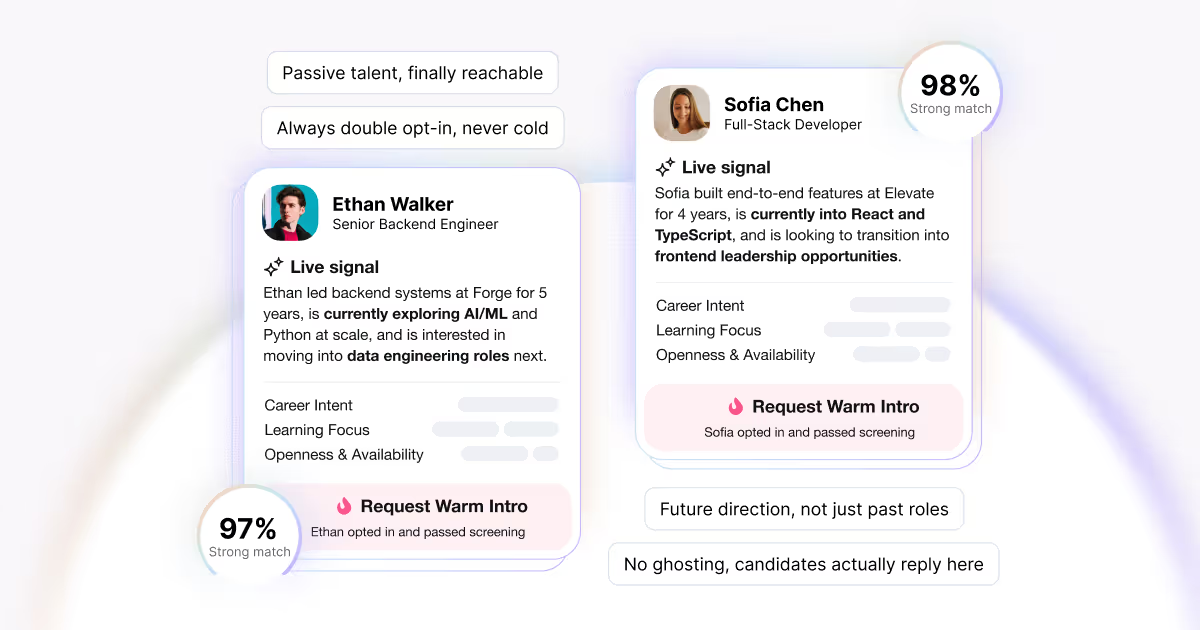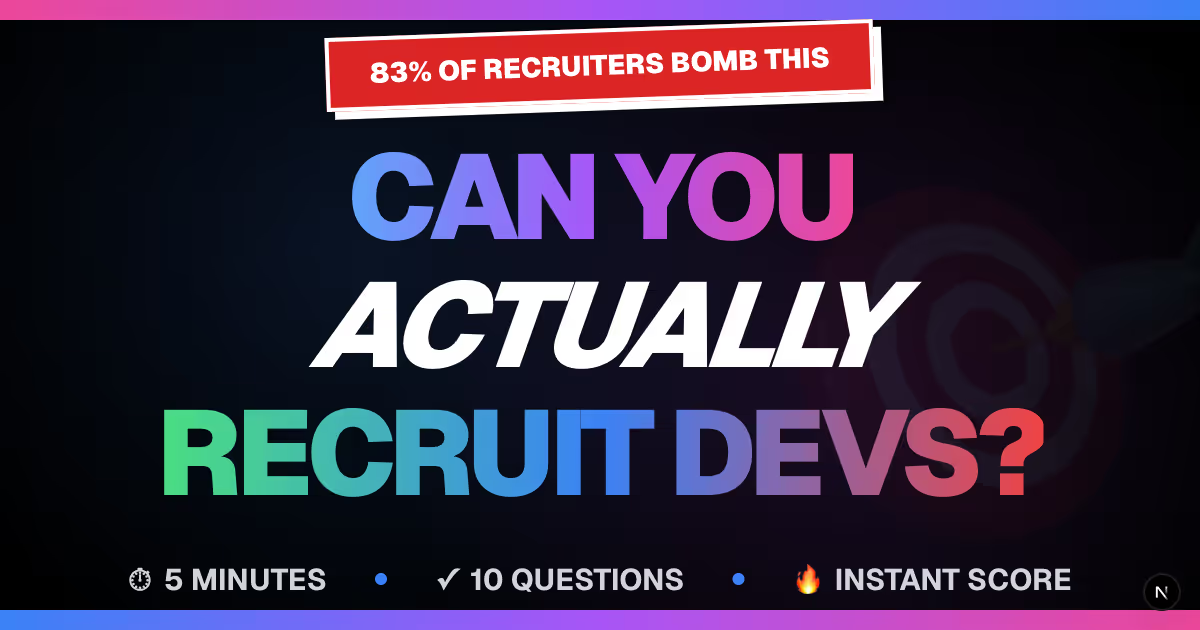


Learn how to build an AI team by managing the hiring process directly, avoiding costly agency fees while finding top talent.
Want to build an AI team without overspending on agency fees? Here's the key: manage the hiring process yourself. Recruitment agencies often charge up to 20-30% of an engineer's annual salary, making it costly to hire AI talent. By using developer-focused platforms and direct sourcing, you can cut these expenses significantly while still finding skilled professionals.
Key Takeaways:
- Why agency fees are high: Agencies invest heavily in sourcing and vetting candidates, passing those costs to you.
- How to save money: Skip agencies and use platforms like daily.dev Recruiter to connect directly with AI engineers.
- What to prioritize: Focus on technical skills (Python, TensorFlow, MLOps) and soft skills (problem-solving, communication).
- Efficient screening: Use tools like portfolio reviews, project-based tasks, and technical discussions to evaluate candidates.
- Transparent hiring: Share salary ranges, job expectations, and growth opportunities to attract top talent.
Direct sourcing not only reduces costs but also gives you control over the hiring process, ensuring a better fit for your team. Platforms like daily.dev Recruiter simplify this approach with fixed pricing and access to a pool of skilled developers, helping you hire faster without hidden fees.
Do You Have What it Takes to Hire the BEST AI Talent?
Why AI Engineer Recruitment Costs So Much
The rapid rise of AI has sparked fierce competition for top talent, and recruitment agencies often charge hefty fees that can stretch your budget. Let’s break down why hiring AI engineers comes with such a high price tag.
What Drives Up AI Engineer Recruitment Costs
The demand for skilled AI professionals is sky-high, and finding candidates with the right mix of technical expertise and analytical skills isn’t easy. Recruitment agencies often need to dedicate significant resources to locate and vet these specialists. On top of that, some agencies tack on additional fees for services like candidate assessments, technical interviews, or even placement guarantees, further inflating costs.
The Financial Impact of Agency Fees
Traditional recruitment agencies can put a serious dent in your budget. Their fees - usually calculated as a percentage of the engineer’s salary - can add up quickly, cutting into your return on investment.
On the other hand, direct hiring methods offer a way to sidestep many of these costs. By focusing on targeted job postings or leveraging specialized developer networks, companies can significantly reduce recruitment expenses. This approach often leads to faster hires, helping you keep projects on schedule while managing costs more effectively.
It’s also worth noting that traditional agencies sometimes include hidden charges, such as fees for replacement guarantees or extended payment terms. These extra costs can sneak up on you, making direct hiring strategies an even more appealing option for protecting your budget.
How to Define Your AI Engineer Requirements
Clearly defining your requirements is the first step toward an efficient and cost-effective hiring process. Before diving into the search for AI talent, outline the exact technical and interpersonal skills you're looking for. This clarity not only helps you avoid costly hiring mistakes but also ensures your expectations align with the current job market. Below, we break down the key technical and soft skills you should prioritize and offer tips for crafting job descriptions that attract top-tier AI engineers.
Key Skills to Look for in AI Engineers
When hiring AI engineers, technical expertise is non-negotiable. Start with Python - it's the backbone of most AI and machine learning projects. Candidates should also have hands-on experience with frameworks like TensorFlow and PyTorch, essential tools for building and training AI models.
With the rise of generative AI, natural language processing (NLP) has become increasingly valuable. Look for engineers who can handle text data, create chatbots, or develop language models. Similarly, data engineering skills are critical since AI engineers must work with large datasets, clean and prepare data, and build pipelines that feed into machine learning workflows.
Experience with cloud platforms like AWS, Azure, or GCP is another must-have. AI engineers need to understand how to deploy models, manage cloud infrastructure, and scale solutions effectively. Additionally, MLOps expertise ensures that engineers can bridge the gap between research and production, making AI models functional in real-world scenarios.
Soft skills are just as important for ensuring team success. Strong communication skills allow engineers to explain complex ideas to non-technical stakeholders and collaborate across departments. Problem-solving abilities help them tackle unexpected challenges and implement creative solutions when standard methods fall short.
Finally, leadership and collaboration are crucial, especially for projects involving cross-functional teams. Engineers who can work well with others and occasionally take the lead on technical initiatives add significant value to your organization.
| Skill Category | Essential Skills | Why They Matter |
|---|---|---|
| Technical | Python, TensorFlow, PyTorch, NLP, Cloud Platforms (AWS/Azure/GCP) | Core tools for building and deploying AI solutions |
| Soft Skills | Communication, Problem-solving, Collaboration, Leadership | Ensure teamwork and effective stakeholder engagement |
| Specialized | MLOps, Data Engineering, Model Deployment, Generative AI | Connect research to production and handle advanced tasks |
How to Write Job Descriptions That Attract AI Engineers
Your job description is your first chance to make an impression - so make it count. Start with a compelling summary that explains why the role matters and highlights the specific projects or challenges the candidate will tackle.
Be upfront about salary ranges to build trust and streamline the hiring process. For example, if you're offering $120,000-$180,000 for a mid-level AI engineer, include that information in the posting. This transparency reflects your respect for candidates' time and helps attract serious applicants.
Showcase opportunities for professional growth, such as access to conferences, training programs, or cutting-edge projects. Flexibility is another major draw - mention if you offer remote work options or flexible schedules.
Focus on the technical challenges of the role rather than just listing qualifications. For instance, instead of saying "3+ years of Python experience", describe specific tasks like building recommendation systems that process millions of interactions. This approach gives candidates a clear picture of the work and gets them excited about solving real problems.
To cast a wider net, separate requirements into "must-have" and "nice-to-have" categories. With the current 3:1 demand-to-supply ratio for AI talent, overly restrictive criteria could shrink your candidate pool unnecessarily.
Finally, include details about your team culture and workflows. Mention whether you use agile methodologies, how code reviews are handled, or what your deployment process looks like. AI engineers want to know they'll be joining a team that values organization and good engineering practices.
Wrap up your job description with clear instructions on next steps and timelines. Let candidates know what to expect in the interview process and how long it typically takes. This kind of transparency not only sets the right expectations but also speeds up the hiring process, reinforcing your commitment to an efficient recruitment strategy.
Using Developer Networks to Find AI Talent Directly
Once you've outlined what you're looking for in an AI engineer, the next step is finding qualified candidates without relying on expensive recruitment agencies. Traditional job boards and cold outreach often fall short, especially when it comes to connecting with passive talent. Developer-first platforms, however, offer a better way to engage with engineers in spaces where they already interact with industry content and focus on honing their skills.
The big advantage of these networks? Access to passive talent - engineers who aren’t actively job searching but are open to the right opportunity. By meeting them directly in their professional environment, you can sidestep the crowded, competitive nature of larger job platforms. This method allows you to have meaningful interactions in spaces where professional conversations are already happening.
How Developer-First Platforms Simplify Sourcing
Once you have a clear idea of your hiring needs, platforms like daily.dev Recruiter make it easier to find the right candidates. daily.dev Recruiter connects you with a thriving community of developers, including AI engineers, through warm, double opt-in introductions. When you post a job, it reaches developers as they browse industry updates, explore new technologies, and interact with relevant content.
This approach encourages authentic conversations from the outset, helping build trust during the hiring process. Instead of sending out generic, impersonal messages, you’re introduced to engineers who’ve already expressed interest in opportunities that match your role.
Additionally, daily.dev Recruiter’s community-driven setup goes beyond resumes. You’re tapping into a network of professionals who actively share knowledge and showcase their expertise. This gives you valuable insight into a candidate’s technical interests and skills before any formal discussions take place.
Saving Time and Cutting Costs with Direct Sourcing
Using daily.dev Recruiter for direct sourcing not only reduces costs but also speeds up the hiring process. By eliminating agency fees and offering transparent pricing, this method allows you to manage candidate communication directly, making your hiring efforts more efficient and cost-effective.
Direct sourcing also helps you create a dependable hiring pipeline. You can adjust your search in real time and connect with candidates faster, ensuring a smoother, more streamlined recruitment process.
sbb-itb-d1e6221
How to Screen and Assess AI Engineers Efficiently
Once you've connected with potential candidates, the next challenge is evaluating their skills quickly and effectively. Traditional screening methods can slow down the hiring process, but by using structured assessments and modern tools, you can identify top talent faster while maintaining high standards. Streamlining this step not only saves time but also reduces recruitment costs, keeping your hiring pipeline efficient.
The key is finding the right balance between thorough evaluation and speed. It's crucial to assess technical skills, problem-solving abilities, and how well a candidate aligns with your team dynamics - all without creating a cumbersome process that might deter strong candidates. AI engineers, in particular, value a hiring experience that respects their time and expertise. A well-designed, efficient process ensures you can focus on what matters most: their capabilities.
How to Test AI Engineers' Skills and Knowledge
Accurate screening begins with practical and targeted assessments. This means going beyond generic tests and leveraging methods like portfolio reviews, project-based challenges, and in-depth technical discussions. These approaches provide a clearer picture of a candidate's real-world abilities.
- Portfolio reviews: A candidate's portfolio is often a goldmine of information. Look for projects that showcase their ability to handle the full AI pipeline - from data preprocessing to deploying models. Pay attention to their choice of frameworks, how well they document their work, and their strategies for improving model performance. A strong portfolio can often tell you more about their skills than a traditional interview ever could.
- Project-based simulations: These are excellent for assessing problem-solving skills in a practical context. For example, if your team is working on a recommendation system, you could ask candidates to create a basic collaborative filtering model using a sample dataset. This type of task not only evaluates their technical skills but also gives you insight into how they approach challenges and explain their solutions.
- Technical discussions: Conversations focused on specific AI topics can help separate those with deep expertise from those with surface-level knowledge. You might discuss the trade-offs between different neural network architectures, when to use supervised versus unsupervised learning, or how to handle data drift in production models. Their ability to articulate these concepts and provide thoughtful answers can reveal a lot about their experience and understanding.
daily.dev Recruiter's Screening Tools

daily.dev Recruiter simplifies the hiring process with tools designed to match candidates to your exact needs. You can set filters based on experience, AI specializations, programming languages, and preferred frameworks, allowing you to zero in on the most relevant profiles without wasting time on manual reviews. This aligns perfectly with a direct sourcing strategy, giving you control over every step of the hiring pipeline.
The platform also integrates seamlessly with your existing ATS (Applicant Tracking System), ensuring candidate information flows smoothly into your workflow. Plus, because daily.dev Recruiter connects you with developers active in their professional communities, you get valuable insights into their contributions and expertise even before the formal screening process begins.
Manual vs. AI-Powered Screening Methods
Both manual and AI-powered screening methods have their place in the hiring process. Manual screening is ideal for evaluating soft skills, communication, and team compatibility through personalized interviews. On the other hand, AI-powered tools excel at quickly and consistently assessing technical skills, especially when dealing with a large pool of candidates.
The best approach combines both methods: use AI-powered tools for initial technical evaluations, then follow up with manual interviews to assess cultural fit and strategic thinking. This hybrid approach ensures a thorough yet efficient hiring process.
How to Engage and Hire Top AI Talent
Once you've effectively screened candidates, the next step is turning those prospects into hires. This phase demands a different strategy compared to traditional recruitment. AI engineers are often passive candidates who value transparency, respect for their time, and alignment with their career aspirations. Building genuine relationships is key - rushing the process won't work here.
How to Personalize Your Approach to AI Engineers
Sending out generic messages? That’s a quick way to lose an AI engineer's interest. Instead, take the time to learn about their professional background, current projects, and career goals. Dive into their GitHub repositories, read their recent publications, or check out their open-source contributions. This research helps you create outreach messages that truly resonate with their expertise and interests.
When you reach out, focus on how their skills align with specific challenges your team is tackling. Highlighting these connections shows you’ve done your homework and makes your message stand out.
Skip the heavy sales pitch and go straight to the details. AI engineers want to hear about the real work they’d be doing - what problems they’d solve, the tech stack they’d use, and the broader impact of their contributions. Sharing challenges openly can also be a plus since many AI engineers thrive on solving tough problems.
Also, consider where they are in their career. A senior engineer might be looking for leadership roles or opportunities to design systems from the ground up, while someone earlier in their career could be more focused on mentorship and skill-building. Tailor your communication to reflect these priorities, emphasizing how the role supports their growth.
This personalized approach not only grabs their attention but also lays the groundwork for trust - an essential factor in turning interest into a job offer.
Why Trust Matters in AI Engineer Recruitment
Trust is everything when it comes to recruiting AI engineers, and it starts with how you make contact. Overly aggressive outreach can harm your reputation in the tight-knit AI community. Platforms like daily.dev Recruiter use a warm, double opt-in system, ensuring both parties are genuinely interested in connecting. This approach fosters better initial conversations and builds mutual respect right from the start.
Being transparent is equally important. Clearly outline timelines, next steps, and expectations. If the role comes with challenges - like tight deadlines, legacy systems, or budget constraints - address them upfront. AI engineers value honesty and are more likely to engage when you’re clear about both the opportunities and potential hurdles.
Clear Pricing and No Hidden Costs
One standout benefit of using daily.dev Recruiter is the straightforward pricing. Traditional recruitment agencies often charge a hefty percentage of a candidate’s first-year salary, making costs unpredictable. In contrast, daily.dev Recruiter operates on a simple subscription model with a fixed monthly fee. This makes budgeting easier and eliminates the surprise expenses that come with traditional hiring methods.
Plus, there are no hidden fees for candidate replacements or special placements. This transparency not only makes financial planning simpler but also signals to candidates that your company is genuinely investing in its hiring process. It’s a win-win for both your team and the talent you’re looking to bring on board.
Building a Cost-Effective AI Hiring Process
Finding the right AI talent can be a challenge, but direct sourcing through developer-focused platforms is changing the game. Tools like daily.dev Recruiter make it easier and more affordable to hire top-tier AI professionals while cutting down on time and resources.
One standout feature of daily.dev Recruiter is its subscription-based pricing model. Unlike traditional recruitment agencies that charge hefty percentage-based fees, this model offers clear, upfront costs. This predictability allows companies to plan and scale their AI teams without worrying about surprise expenses - a significant advantage for businesses aiming to stay within budget.
Another major benefit is the platform's warm, double opt-in system. Instead of wasting time on cold outreach, recruiters can connect directly with pre-qualified developers who have already expressed interest in exploring new opportunities. This approach not only saves time but also ensures you're engaging with candidates who are both skilled and motivated.
Additionally, the platform gives access to a pool of passive talent - professionals who may not be actively job hunting but are open to the right opportunities. These developers are often highly skilled, staying up-to-date with the latest industry trends and continuously honing their technical abilities.
To streamline the hiring process further, focus on three key areas: targeted outreach, efficient screening, and transparent communication. With daily.dev Recruiter, advanced targeting tools help you connect with AI engineers who have the specific skills your projects demand. Combined with efficient screening methods and clear communication, this ensures a smoother path from sourcing to onboarding.
For companies looking to grow their AI teams without breaking the bank, daily.dev Recruiter offers a smart, cost-effective solution that blends affordability with quality and speed.
FAQs
What are the best ways to evaluate the technical skills of AI engineer candidates without using recruitment agencies?
To assess the technical skills of AI engineer candidates without involving recruitment agencies, a combination of practical tools and methods can be highly effective.
Start by creating technical assessments that mirror the challenges your team typically encounters. For instance, you could design coding tasks or machine learning model-building exercises that candidates complete within a set timeframe. Using platforms that provide automated feedback on code quality and performance can help streamline this process and save time.
Another approach is conducting technical interviews where candidates walk you through their thought process and problem-solving strategies. You might ask them to discuss past projects, explain algorithms they've implemented, or detail how they fine-tune AI models. This not only highlights their technical expertise but also gives insight into their communication skills.
Additionally, AI-powered hiring tools can be a valuable resource. These tools objectively analyze candidates' skills and help simplify the evaluation process, ensuring a fair and efficient selection while keeping costs manageable. Combining these strategies will help you thoroughly assess candidates' abilities without stretching your resources.
What are the benefits of using developer-focused platforms like daily.dev Recruiter to hire AI engineers?
Using developer-centric platforms like daily.dev Recruiter can make a big difference when you're looking for AI engineers. These platforms are built with tech professionals in mind, giving you direct access to skilled developers right in their professional environments. This not only speeds up the hiring process but also ensures you're connecting with candidates who are deeply engaged in the developer community.
What’s more, these platforms come with tools specifically designed for tech recruitment, like AI-driven candidate matching and efficient workflows, which can help cut down on hiring expenses. Plus, by focusing on creating a developer-friendly experience, these platforms make it easier to attract top-level AI talent - without the hefty fees often tied to traditional recruitment agencies.
What are some effective ways to create a transparent and engaging hiring process for AI engineers?
To bring in top-notch AI engineers, you need a hiring process that's clear, engaging, and candidate-focused. Start with a well-crafted job description that spells out the role’s responsibilities, must-have skills, and opportunities for growth. Be transparent about the hiring timeline, salary range, and other details that matter to prospective candidates.
When it comes to the selection process, use structured interviews and skill-based assessments to ensure a fair evaluation. Incorporating AI-powered hiring tools can help you assess technical abilities more effectively while reducing bias. Keeping candidates in the loop with regular updates and offering constructive feedback can make a big difference in their experience.
Don’t forget to showcase what makes your company stand out. Use your careers page, social media, or even the interview process to highlight your company culture and values. Show how your organization encourages innovation and supports professional development - qualities that AI professionals often look for in an employer.
Related Blog Posts








